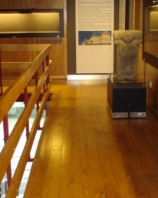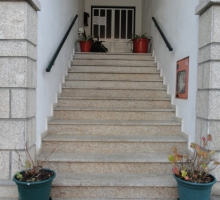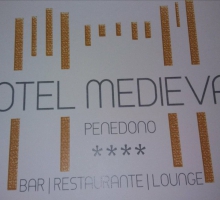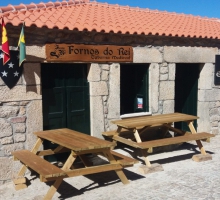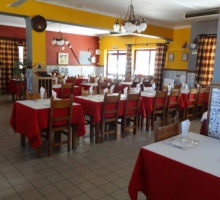This topic of Identity and Memory of Penedono intends to show some fragments of the Past…
This is a place where the ancestors’ memories acquire an aesthetic sense.
It is unknown when the first human beings started moving around and settled down in Penedono’s area. At the end of the V – beginning of the IV – millennium b.C. (Mid/ Final Neolithic) there are signs of the presence of shepherds par excellence, who completed their subsistence through hunting, fishing, cropping natural vegetal resources and the practice of a primitive agriculture.
These small communities wee yet anware of metal techniques, so they made their tools out of wood, bones or stones. Among other findings, there were ceramic vessels, arrowheads, blades, axes, adzes, gouges, grindstones ornament objects, obtained from various types of rocks and other materials.
The preoccupation with life after death, led them to construct stone structures – Dolmens – for the purpose of depositing the bodies or the bones of a restricted number of individuals. In Penedono we must refer to the presence of various necropolises at Senhora do Monte (Penela da Beira/ Castainço) and at Lameira de Cima (Antas).
During the III millennium b.C. (Calcolithic), there was the upsurge of metallic objects (copper and gold) and the arise of settlements of a longer utilization.
During the first centuries of our time, is noticeable a Romanization of Penedono, mainly by the findings of ceramic fragments from constructions, either industrial or domestic, columns and grindstones scattered over the land surface. A particular deference is made to the gold mines of Santo António (Granja), presumably already explored in Roman times; the site of Casteidal (Penela da Beira); the votive alter at Quinta da Arca and the rock engravings of Rodelas and Marcadouro (Penela da Beira).
It was during the Middle Ages that Fernando I, O Magno, reconquered territories from the Arabs for Penedono between 1055 and 1057.
Later on, with the liberal reform in the XIX century, the various councils that existed in these cities were unified and formed what is today Penedono.
Location: Penedono
This is a place where the ancestors’ memories acquire an aesthetic sense.
It is unknown when the first human beings started moving around and settled down in Penedono’s area. At the end of the V – beginning of the IV – millennium b.C. (Mid/ Final Neolithic) there are signs of the presence of shepherds par excellence, who completed their subsistence through hunting, fishing, cropping natural vegetal resources and the practice of a primitive agriculture.
These small communities wee yet anware of metal techniques, so they made their tools out of wood, bones or stones. Among other findings, there were ceramic vessels, arrowheads, blades, axes, adzes, gouges, grindstones ornament objects, obtained from various types of rocks and other materials.
The preoccupation with life after death, led them to construct stone structures – Dolmens – for the purpose of depositing the bodies or the bones of a restricted number of individuals. In Penedono we must refer to the presence of various necropolises at Senhora do Monte (Penela da Beira/ Castainço) and at Lameira de Cima (Antas).
During the III millennium b.C. (Calcolithic), there was the upsurge of metallic objects (copper and gold) and the arise of settlements of a longer utilization.
During the first centuries of our time, is noticeable a Romanization of Penedono, mainly by the findings of ceramic fragments from constructions, either industrial or domestic, columns and grindstones scattered over the land surface. A particular deference is made to the gold mines of Santo António (Granja), presumably already explored in Roman times; the site of Casteidal (Penela da Beira); the votive alter at Quinta da Arca and the rock engravings of Rodelas and Marcadouro (Penela da Beira).
It was during the Middle Ages that Fernando I, O Magno, reconquered territories from the Arabs for Penedono between 1055 and 1057.
Later on, with the liberal reform in the XIX century, the various councils that existed in these cities were unified and formed what is today Penedono.
Location: Penedono
